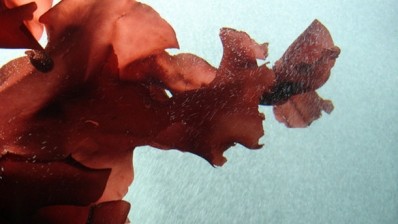Red seaweed extract shows joint health benefits
Lithothamnion Corallioides may improve osteoarthritis
symptoms by about 15 per cent, say the results of a new pilot
study.
Measures of pain, stiffness and physical function associated with osteoarthritis (OA) improved after receiving a daily dose of Marigot's Aquamin ingredient for three months, report researchers in the open access Nutrition Journal .
The study, funded by Irish company Marigot, builds on previous studies indicating benefits for bone health, and is the first time that the ingredient has been tested in relation to joint health, David O'Leary, Marigot's commercial director, told NutraIngredients.com.
"This trial was designed as a preliminary pilot trial to investigate the potential of a marine derived multi-mineral supplement to reduce symptoms of moderate to severe knee osteoarthritis," wrote lead author Joy Frestedt from the Minnesota Applied Research Center in the Nutrition Journal .
Approximately seven million people in the UK alone are reported to have long-term health problems associated with arthritis.
Around 206 million working days were lost in the UK in 1999-2000, equal to £18 billion (€26 billion) of lost productivity.
Study details Frestedt, collaborating with scientists from Marigot and the Geriatric Research Education and Clinical Center in Minneapolis, recruited 70 people with mild to severe osteoarthritis aged from 25 to 70 to take part in the randomised, double blind, placebo controlled trial.
The subjects were assigned to one of four parallel intervention groups, and supplemented with Aquamin (2400mg per day), glucosamine sulphate (1500mg per day), a combination of glucosamine sulphate and Aquamin, or placebo for 12 weeks.
"The dose of the mineral supplement Aquamin was determined based on previous anecdotal experience," explained the researchers.
The researchers used Western Ontario and McMaster Universities (WOMAC) pain, function and stiffness subscales to quantify the results, and also used a six minute walking test to assess physical function.
At the end of the study period, data from the 50 people who completed the study showed that only subjects receiving the red seaweed extract or glucosamine sulphate experienced a significant improvement in symptoms.
The WOMAC scores showed a 14.9 per cent improvement in pain, stiffness and physical function in the Aquamin group, while a 10.9 per cent improvement was recorded in the glucosamine group.
In the six minute walking test, the Aquamin and glucosamine sulphate groups demonstrated an improvement of 30.8 metres (101 feet, 7 per cent) and 17.1 metres (56 feet, 3.5 per cent), respectively.
"Although, these distances appear to be small, our subjects with severe osteoarthritis indicated that the ability to walk even a little bit further was important to them," wrote the researchers.
Interestingly and "surprisingly," they said, no significant improvements in osteoarthritis symptoms for people receiving the combined supplement.
"Additional study of longer treatments in a greater numbers of subjects would be helpful to… explore the lack of any treatment effect for the combination of Aquamin and glucosamine sulphate in this small pilot trial," wrote the researchers.
"Although these products are unlikely to have reacted in the tablet form it is interesting to speculate about a possible dietary interaction, possibly related to the very basic nature of Aquamin (pH 10) compared to the acidity of the Glucosamine Sulphate (pH of 3.5 to 5), and the requirement for this to ionize in the stomach to be effective," they added.
Active ingredients "Aquamin is composed of multiple minerals and the 'active ingredient' for the complex is difficult to determine," wrote Frestedt in the Nutrition Journal .
"A number of the minerals in Aquamin may have anti-inflammatory and anti-oxidant properties which might directly and/or indirectly influence the efficacy of this unique complex."
Calcium is reportedly the main mineral present, and at the dose used in this study the red seaweed extract would provide 80 per cent the US RDA.
Important concentrations of magnesium, manganese, and selenium were also quoted by the researchers as potentially playing an active role.
Specifically, the extract contains 74 trace minerals, said O'Leary, making it difficult to make a direct comparison with potentially competing ingredients.
"It is a very unique species," he said.
The red seaweed is harvested off the coast of Ireland and Iceland.
Areas of study Research is ongoing in the field of joint health, confirmed O'Leary, with a longer study anticipated.
Moreover, the company is funding animal and human studies to explore the potential of the ingredient to offer benefits for cardiovascular and heart health, and digestive health, he said.
"All the findings have been very positive so far," he said.
Formulation potential According to Marigot, the ingredient can be used in a wide variety of food, beverage and dietary supplement applications, including mineral waters, breakfast juices, chocolates, smoothies, soy beverages, and yoghurts.
The red seaweed ingredient, available internationally, comes in four commercial grades at low, neutral and high pH values, said O'Leary, and can be formulated into products "across all pH ranges" .
"Demand is increasing," he added.
Source: Nutrition Journal 2008, 7 :9 doi: 10.1186/1475-2891-7-9 "A natural mineral supplement provides relief from knee osteoarthritis symptoms: a randomized controlled pilot trial" Authors: J.L. Frestedt, M. Walsh, M.A. Kuskowski, J.L. Zenk
This article is available at: http://www.nutritionj.com/content/7/1/9












